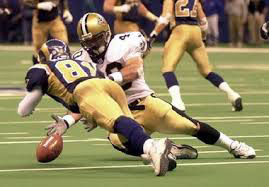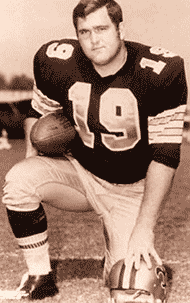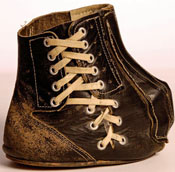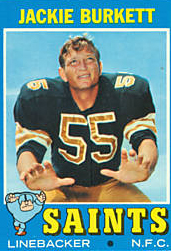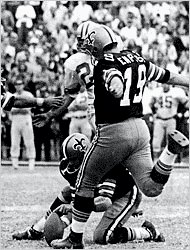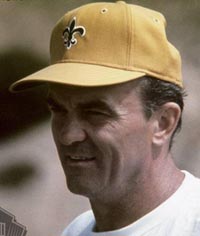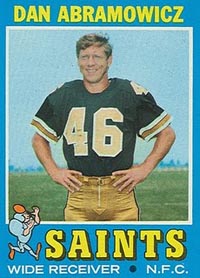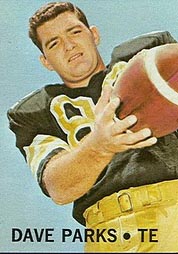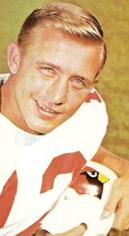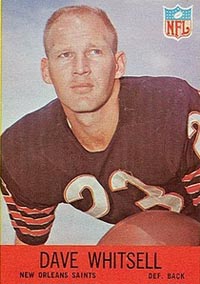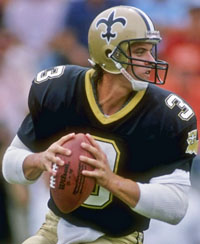
Bobby Hebert
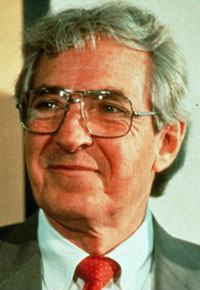
Jim Finks
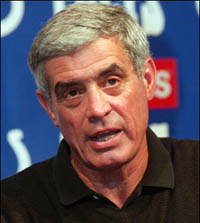
Jim Mora
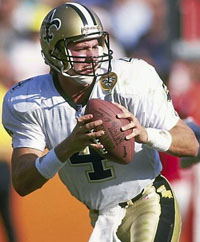
Steve Walsh
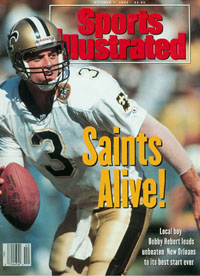
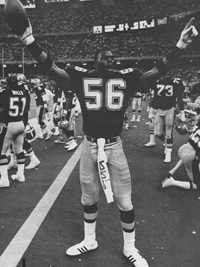
Pat Swilling
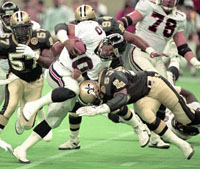
Saints-Falcons playoff action 1991
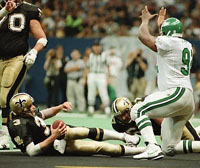
Eagles throw Hebert for safety in 1992 playoff
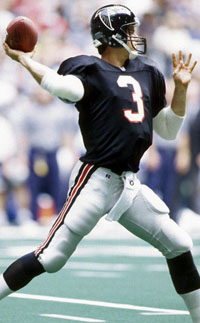
Bobby Hebert with Falcons
|
From January 1990 through July 1991, a great deal happened in the life of Saints QB Bobby Hebert. Unfortunately, none of it occurred on the football field.
- For the first time in almost 20 years, Hebert went an entire season without playing football.
- Besides having to endure the fact that his friends and teammates were competing each Sunday without him, Bobby faced adversity in his personal life.
- Within a two-week span, his grandmother died, his father was diagnosed with cancer, and his 29-year-old sister committed suicide.
- What I went through in my private life was a lot harder to face than what I did from a football standpoint, said Hebert when he returned to football the following year. It was very hard. At first, I thought it was a bad dream, and that it could only happen to someone else. My dad is relatively young - he's only 52. I want him to see my kids grow up. He's been a big part of my life. That was really a rough time in my life, and certainly with the football situation, it just compounded the matter.
The "football situation" started after the '89 season.
- After leading the Saints to a 12-3 record in 1987, 9-7 in '88, and 8-8 in '89, Bobby was upset that Coach Jim Mora had replaced him with John Fourcade the last three games of the '89 campaign.
- So he asked GM Jim Finks to trade him, preferably to the Oakland Raiders. I have to do what I feel is best for me and my family, explained Bobby. But Finks refused and placed Hebert on the "protected" list.
- Hebert: The Saints offered me something around $700,000. I wanted the going rate for a QB at my level, around $1.2 million. I remember Mr. Finks telling me, "We own you." I remember (former Saints coach) Hank Stram saying, "Coaches are ranchers, and players are cattle. You can always buy cattle."
- I could have gone to the Raiders, but the Saints didn't want to trade me. They said they did, but that wasn't the case. The offer they made was one of those take it or leave it deals. They felt they held all the cards. They just wanted me to sit and rot; they thought I'd come around.
- Hebert didn't "come around." He sat out the 1990 season. Everyone thought I was crazy, reaclled Bobby, but I had enough money put away to get by. I didn't feel I was taking a risk. I didn't have any bills. I had shelter and food for my family. I remember someone once telling me real pressure is when you're an unemployed steel worker with eight kids to feed. That's real pressure. I was never at that point.
When Bobby didn't budge, the Saints sent the Cowboys three high draft picks for QB Steve Walsh.
- With the second-year pro under C, the Saints finished the 1990 season with an 8-8 record, good enough to make the playoffs as a wildcard.
- They lost to the Bears 16-6 at Soldier Field in the first round of the playoffs.
- Hebert on his first season not playing football since sixth grade: There were a lot of times where I was anxious and wanted to play. Mentally, I just tried to focus my mind in a different direction. I told myself that I was going to be positive about the whole situation. I spent more quality time with my wife and kids, which I normally wouldn't have been able to do at that time. I tried not to worry about the things I couldn't control. Working out and staying in shape are things I could control. I was able to remain positive no matter what the situation looked like.
While all this was going on, the NFL players union decertified to allow players to become plaintiffs in court action.
- Hebert joined a group of players filing a class-action against the league.
- Since Bobby was the only player in the group who had sat out an entire season, his testimony was the most compelling in Judge David Doty's court in Minneapolis.
- As a result, the damages Hebert received were three times more than he would have gotten had he played in 1990.
In a
3/6/2011 article in the Times-Picayune right after 81-year-old Judge Doty again ruled in favor of the players against the NFL, Peter Finney asked Hebert what he remembered about Doty in the 20-year-old case. The judge was all business, and he made me laugh. I'll never forget the time he stopped me in mid-sentence. He said, "Mister Hee-bert, would you mind speaking a little slower? The stenographer is having a hard time keeping up and understanding what you are saying."
The Baton Rouge native who grew up in Lafourche Parish returned to the Saints for the '91 season.
- He showed up at a Saints minicamp in the spring of '91 but was turned away because he had no contract.
- He signed a two-year deal June 4, 1991. It guaranteed him $1.3 million in '91 and $1.45 million in '92. Both figures were below the norm for QBs with Bobby's experience.
- For more than a month prior to training camp, he came to the Saints' practice facility five days a week and watched every offensive play the Saints ran during the 1990 season.
- Although Bobby entered camp fourth on the QB depth chart, he went about the same routine that he did two years earlier when he was the starter. Physically and mentally, I approached things the same way. I think you have to continue to work hard and try to get better as a player, whether you go in as the No. 1 guy, the No. 2 or the No. 3 guy. I was a little nervous at first, but you wouldn't be human if you weren't. I took the approach that I was going to take it one day at a time; work as hard as I possibly can and try to do my best. You have to go out, produce, and work hard each day to help the team get where they want to be at the end of the season.
- From the moment he stepped on the practice field in La Crosse, WI, Hebert was the center of attention. A week before the regular season, Mora named him the starting QB.
- An open letter from the editor of the Times-Picayune as well as a big banner hanging in the Superdome for the '91 season opener demanded that the "good Cajun boy" apologize for missing the '90 season. I'm not so prideful that I wouldn't apologize, said Hebert, but I don't know what they want me to say.
During Bobby's holdout, after thieves robbed a New Orleans clothing store, police discovered everything of value had been stolen except a set of expensive Saints' jerseys inscribed with Hebert's name and number.
A policewoman asked the pertinent question: Who could they sell Hebert's shirts to?
Bobby was disappointed in the attitude of the fans. Most of the fans who come to the Superdome every Sunday are common, ordinary Louisiana folks like me. It's kind of troubling that they would stick up for (multi-millionaire owners) instead of one of their own.
- Instead, he made amends on the field. On September 1, he led the Saints to a come-from-behind 27-24 victory over Seattle - just the sixth opening day way in the Saints' 25-year history.
- With Bobby back at the controls, the Saints won their first three games. When he ran onto the field for Game Four to more cheers and boos, he knew he had the fans back in his corner. I thought, "Man, I want to play so well for these people.
- The Saints won that day to go 4-0 for the first time in franchise history on their way to a six-game streak. That torrid start, coupled with Hebert's successful comeback, brought a wave of national attention, including his picture on the cover of Sports Illustrated. Read the 10-7-91 SI article on the Saints.
- Some fans may have been upset with Bobby but not his teammates. There isn't a man in this locker room who was upset with Bobby, said LB Pat Swilling. When Bobby came back to the team, I went over, and we had a little hug. I've been through that with Jim Finks myself.
Unfortunately, a shoulder injury in the season-opening win hampered Bobby for the remainder of the year.
- He was forced to leave a week-six victory at Philadelphia early. After reaggravating the shoulder for the third time two weeks later, Hebert sat out the next six games. It was very hard, recalled the 6-4, 215 lb QB. You want to do what's best for the team in the long run, which is to get to the playoffs. If you continue to play to the point where you're so deteriorated, then you're not helping the team. I played as long as I felt I could be productive. When it wasn't gettin better, I knew it was time to give it a rest and rehabilitate so I could try to get back to a level where I wanted it to be.
- When the Cajun Cannon left the lineup, the Saints had a three-game lead in the NFC West. When he returned with two weeks to play, they were tied with Atlanta. In his first game back, he passed for a career-high 320y in a 27-0 win over the Raiders. The next week, at Phoenix, Hebert guided the Saints to a 27-3 triumph over the Cardinals, clinching the team's first-ever NFC West title.
- That was a great feeling and was real emotional, said Hebert. Just looking at Coach Mora and how much it meant to him and how we came through the adversity that we did as a team was satisfying. I don't care who you are, you're going to be faced with setbacks along the way. You have to be able to rise above that to be successful. It was a great feeling to be part of something that you can share with other people.
- After splitting their last ten games to end '91 with an 11-5 record, the Saints hosted the Falcons but lost 27-20 in the wild card playoff.
- He ranked fourth among NFC starting QBs with a completion % of 60.1. He threw for 1,676y and nine TDs.
- His resiliency earned him the Victor Awards NFL Comeback Player-of-the-Year for 1991.
Hebert's fortunes off the field also improved.
The '92 Saints finished 12-4, one game better than in '91 but finished two games behind the 49ers in the NFC West.
- Hebert again missed part of the season, playing only nine games, during which the club went 8-1.
- With Walsh in command, Mora's club went 3-4.
- Once again, New Orleans exited the post-season after one game, a 36-20 home loss to the Eagles.
His two-year contract up, Bobby went to the hated Falcons for the last four seasons of his career.
- He missed most of the second and third seasons in Atlanta because of injuries.
- His record against his former team was 3-1.
|
References: "New Orleans Saints Spotlight: QB Bobby Hebert," NFL GameDay, Falcons vs. Saints, September 20, 1992
"Gumbo Ya-Ya," Ed Hinton, Sports Illustrated 10/7/1991
"Former New Orleans Saints quarterback Bobby Hebert took risk in 1990 and won," Peter Finney, NOLA.com, March 6, 2011
"The Bridge to Paradise: Saint Quarterback Bobby Hebert Finds Peace in the Heart of Cajun Country," Bob Oates, Los Angeles Times, 1/3/1993
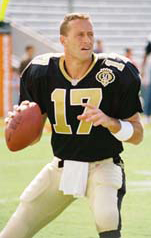
Jim Everett
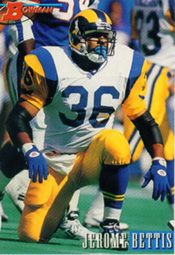
|
"Is it Halloween yet?" So asked LA Rams LB Chris Martin after the Saints' crazy 37-34 victory in the Superdome. Martin was referring to the eerie events that occurred eight days before Ghosts and Goblins Day.
- The Saints' Tyrone Hughes, who played at St. Augustine High School in the Crescent City, returned kickoffs 92 and 98y for TDs. He set NFL records for combined kick returns (374) and kickoff returns (304) and tied the record with 2 kickoff runbacks for TDs.
- Toby Wright returned a fumble 98y for a Rams TD in Q2.
- Robert Bailey returned a punt 103y for a bizarre TD for the game's final points with 4:08 remaining. After Tommy Barnhardt's punt sailed into the EZ for an apparent touchback, the two sides began to change units. Then Bailey picked up the ball and ran down the field through a mob of about 40 players as both teams clearly had too many men on the field. The Saints claimed the ball hit the back line of the EZ and also swore they heard whistles blowing the play dead. With replay review not yet instituted, the officials counted the TD.
- Vince Buck of the Saints and Todd Kinchen of the Rams were ejected for fighting on a punt return.
- LA assistant coach Jim Erkenbeck sustained a concussion on yet another return that spilled over the sideline.
- The two teams combined for 797 all-purpose returns - kickoffs, punts, fumbles, and INTs - but the NFL record book didn't include that category.
The more normal scoring took place like this.
- NO scored on a 3y run by Derek Brown and a 30y pass from Jim Everett to TE Wesley Walls for a 14-0 lead in Q1. LA never caught up.
- Morten Andersen kicked FGs from 21, 40, and 37y. to extend his second-longest scoring streak in NFL history to 166 games. Hughes' first INT in his first start at CB set up the first FG.
The Saints held FB Jerome Bettis to a mere 6y on 18 carries, well below the 212 the gained the last time the teams met the season before. Nor did the visitors fare much better through the air. QB Chris Miller completed 7-of-11 for only 88y with one TD and one INT before leaving at halftime with a concussion. Chris Chandler also went 7-of-11 for 74 in the second half but had two INTs.
The Saints improved their record to 3-5 to tie the Rams for third place in the NFC West.
|
After the disastrous 1-13 season in 1980, the Saints needed a new coach who could turn the franchise around in a hurry.
- The man selected was Oail Andrews Phillips, known as "Bum."
- He had just been fired by the Houston Oilers after leading them to their second straight 11-5 season that ended with a disappointing 27-7 loss to the Oakland Raiders in the first round of the playoffs.
Since GM Steve Rosenbloom and player personnel director Dick Steinberg resigned, Phillips became GM as well as head coach. A disciple of Bear Bryant, Bum was strictly old school.
- He immediately announced that he didn't plan to hire an offensive coordinator. "I've been down that route. I still don't think they are that important."
- Bum believed in running the ball and playing good defense. Ultimately his simple O would be his undoing.
- Phillips disdained the Saints' computerized scouting system. Instead, he kept notes with pencil and paper.
Nevertheless, his first draft ranks as one of the best in franchise history.
- Phillips picked Heisman Trophy RB George Rogers from South Carolina with the first pick of the first round.
- As a supplemental draft choice, Bum took QB Dave Wilson from Illinois.
- In Round 2, he grabbed LB Rickey Jackson of Pittsburgh with a pick obtained in the trade of RB Chuck Muncie to San Diego.
- The third round brought DE Frank Warren (Auburn) and, with a pick acquired from Minnesota, TE Hoby Brenner (USC).
- The Saints drafted another player who proved to be productive all the way down in the 10th round – RB Hokie Gajan from LSU.
- In the twelfth and last round, Phillips chose DT Jim Wilks (San Diego State).
Bum's first Saints aggregation finished 4-12 in 1981, scoring only 207 points.
- The Saints were 4-5 in the strike-shortened 1982 season.
- They improved to 8-8 in 1983 to tie the franchise's best record (1979 under Dick Nolan).
- With hopes for their first winning season, the Black and Gold finished only 7-9 in '84.
- When the '85 club got off to a 1-3 record, Bum was replaced by his son Wade who finished up the 7-9 campaign.
- Jim Mora came aboard in '86 and led the club to its first playoff berth in '87 with many of Bum's player as the core of the squad.
|
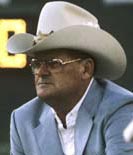
Bum Phillips
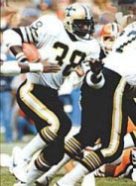
George Rogers
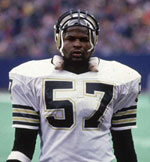 Rickey Jackson |
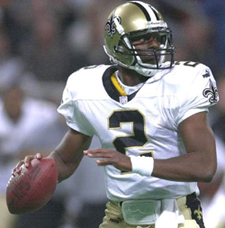
Aaron Brooks
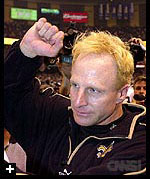
Jim Haslett
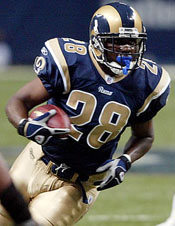
Marshall Faulk
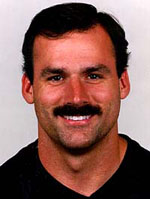
Brian Milne
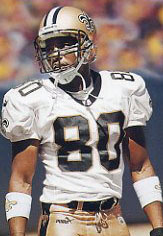
Robert Wilson
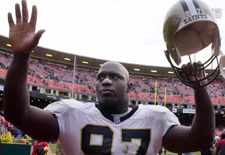
La'Roi Glover
|
The 2000 Saints faced a daunting challenge as they traveled to St. Louis November 26 to face the high-powered Rams, the defending Super Bowl champions.
- The previous Sunday, the Oakland Raiders ended New Orleans' sixgame winning streak 31-22 in the Superdome.
- The visitors were greatly aided by the fact that RB Ricky Williams had fractured his ankle the previous week against Carolina and QB Jeff Blake fractured and dislocated his ankle in Q1. Backup QB Aaron Brooks, who had done little more than occasionally take a knee during his twoyear career, had taken over for Blake.
- After a disastrous start - he was sacked on his first series, then threw an INT on the next - Aaron had done fairly well: 14-for-22 for 187y and two TDs, including a 53-yarder to Willie Jackson.
- The defeat dropped the Saints' record to 7-4, a great improvement over 1999's 3-13 mark that got Mike Ditka fired.
The Saints were 14-point underdogs in Brooks' first NFL start.
- In addition to Williams and Blake, the list of Saints inactive for the game included veteran WR Jake Reed.
- But the odds were more even because St. Louis would also be without their starting QB, Kurt Warner, who suffered from a broken pinkie on his throwing hand.
- The 8-3 Rams had scored 20+ points in 27 straight games to set an NFL record.
- As usual, the Saints would have to contend with native New Orleanian Marshall Faulk, who led all NFL RBs with 57 catches, 643y, and six TDs. In two games against his hometown team in 1999, he had amassed 325 total yards, including 256 on the ground.
First year Saints coach Jim Haslett decided to take the fight to the Rams from the very first play.
- Rob Kelly recovered the onsides kick to set the tone for the game.
- Brooks started the scoring with a pass to reserve FB Brian Milne when the Saints lined up in a two-FB, two-TE goal-line set at the 4.
Milne would torment the Rams again that season by recovering a muffed punt to seal the Saints' first playoff victory.
- Aaron also culminated an 80y drive with a 2y run in Q2 for a 21-7 lead.
- The home team helped the underdogs with mistakes, including 14 penalties - almost as many as the Saints' 17, which was three more than the previous franchise record. Also, Trent Green, Warner's backup, lost two fumbles inside the 10.
- Trailing 24-10, St. Louis rallied to tie the score on Green's 19y pass to WR Ricky Proehl with 11:06 left.
- Brooks then engineered an 11-play 85y drive that consumed more than seven minutes. The crucial play was a 47y pass interference penalty against Todd Light to give NO a first down on the 11. On the previous snap, Aaron had kept the drive alive with a 9y completion to seldom- used WR Robert Wilson on a 3rd-and-8 from the NO 29. Brooks finished the deal by stretching his 6'4" body over the goal line on a 1y sneak with 3:50 remaining.
- The Saints D, which got key contributions from reserves Fred Thomas and Chris Oldham, preserved the 31-24 victory. In the game only because CB Fred Weary suffered a torn anterior cruciate ligament during the first half, Thomas tackled WR Az-Zahir Hakim 1' short of the firstdown marker on a 4th-and-4 play from the Ram 30 with 2:48 left.
- Ron Zook's gang held the Rams to a season-low 279y and sacked Green six times including three by DT La'Roi Glover, who was looking more and more like a certain Pro Bowl pick with 16 sacks. Two of Glover's sacks forced fumbles that ended drives inside the NO 15.
- Brooks outdid his opposing backup, completing 19-of-27 for 190y while Green hit 20-of-41 for 289.
- Faulk gained a season-low 43y of total offense. Oldham and Keith Mitchell spied Faulk's every move.
The Saints' 200th franchise victory moved them into a first-place tie with the Rams in the NFC West. The last time NO had been atop the division so late in the season was 1991, the only year they had ever won the West.
Postgame
- Haslett: I've said it all week that people always worry about when you stick your backup QB in. The guy's really calm and cool, and nothing really rattles him. ... Our defense played great red-zone defense. You can't get much better than that. The Rams ran 16 plays inside the NO 20 but managed just 15y. Their five trips into the red zone resulted in two TDs, one FG, and two turnovers.
- Jackson: We shocked the world. We didn't shock ourselves. That's why they play the game. On paper, everyone says they're going to win. We just came to play and execute and do the things the way we wanted to.
- Jerald Moore, who replaced Williams and gained a team-high 61y, including a 3y TD run: We went out and did what we normally do. Going into each game, we know that we're going to run the ball.
- Rams coach Mike Martz: I don't care who you are. If you turn the ball over as much as we have been doing it, when you look at it being a 14-point swing ... It's awful maddening, I will tell you that.
|
October 27, 1974: Philadelphia Eagles vs New Orleans Saints @ Tulane Stadium
This game is memorable for the longest continuous boo in football history.
- After finishing 5-9 for rookie coach John North in 1973, tied for the best finish in their seven seasons in the NFL, the Saints stood at 2-4 as they hosted the Eagles.
- The previous week North had benched fan favorite QB Archie Manning, reportedly at the insistence of owner John Mecom, in favor of backups Bobby Scott and rookie Larry Cipa. The result was a 13-3 win over Atlanta.
- Manning's future with the team was clouded by a million dollar offer from the Memphis Southmen of the new World Football League. It was rumored that the Saints were trying to trade Ole Miss's favorite son.
- Fortuitously, a knee injury suffered against the Falcons sidelined Scott and brought Archie back as the starter against the Eagles.
So the crowd of 66,257 arrived in a less than happy mood.
- Eagle QB Roman Gabriel put the visitors on the board first with a 5y strike to Harold Carmichael in Q2 two plays after LB Bill Bergey intercepted a Manning pass at the 35 and returned it to the 11.
- The Saint O came to life after receiving the second half kickoff as Archie finished the drive on a 1y run off a broken play.
The strangeness set in later in Q3 when the Eagles reached the Saint 6.
- Incensed by two personal foul calls that aided Philly's advance – one on T Elex Price and the second on LB Wayne Colman – the crowd began booing so loudly that Gabriel backed away from C and asked the referee for quiet. This tactic, of course, served only to incense the faithful all the more.
- Eleven times Gabriel tried to run a play. Each time the booing escalated. Finally, officials sent both teams to the sidelines for a 10-minute break in hopes the crowd would relent.
- When play resumed, so did the noise. Finally, after a 22-minute interruption, Gabriel called a quick count and sneaked up the middle for a 1y gain – a wasted play, essentially. "That S.O.B. tried to fool us," said DT Derland Moore. "He was asking us to help him quiet the crowd, so I stood up to start waving and he goosed the C and tried a quick sneak." DE Steve Baumgartner: "Gabriel was cussing at us at the bottom of the pile, and Derland was just wailing on him. He was punching him and clawing at his face."
- After two more plays failed to dent the EZ, the Eagles settled for an 18y FG by former Saint Tom Dempsey to go ahead 10-7.
The margin held deep into Q4.
- Finally, Manning cranked up a drive from his own 23 with 3:35 remaining.
- The key plays were Archie's 22y scamper up the middle and pass to TE Paul Seal to the Eagle 3.
- FB Jess Phillips plowed over for the winning score.
Some of the Eagles blamed the loss on the 22-minute stoppage.
- Gabriel: "That delay was the difference in the ball game. We would have scored a touchdown. But crowd noise like that disrupts an offense. It's hard to run an offense when you can't hear yourself, can't hear the signals. ... The officials didn't have the guts to do what they were supposed do [penalize the home team]."
- Head coach Mike McCormack disagreed. "That's not the reason we lost. We did not play a very smart football game. We had three drives and one score." McCormack, who called it "the toughest defeat I've ever had since I've been in coaching," credited the Saints. "They were ready and wanted it. We just had some people in a position to make the plays who didn't do it."
References: Tales from the Saints Sideline, Jeff Duncan
The New Orleans Saints: 25 Years of Heroic Effort – Book I, Christian Serpas
|
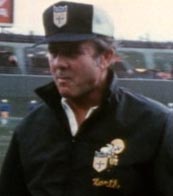
John North
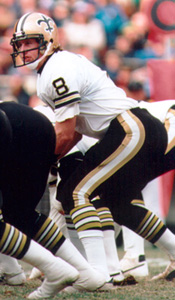
Archie Manning
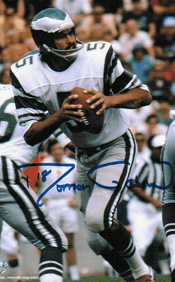
Roman Gabriel
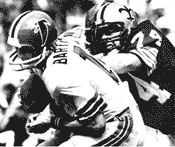
Derland Moore |
|
|
Without a doubt, the best kicker in Saints history is Morten Andersen. And, more recently, Garrett Hartley and Thomas Morstead have won places in Saints lore for their performances in the 2009 post-season. Still, the Saints kicker who is most often mentioned across the NFL is Tom Dempsey because of his one record-setting boot.
- Dempsey overcame severe physical handicaps to become an NFL player. He was big, 6'1", 265 lb, but had to overcome birth defects - only two fingers on his right hand and only a half a right foot.
- He played DE in high school and junior college - he's the only player in NFL history from Palomar Junior College in San Marcos CA. He was also a shot-putter and wrestler at Palomar while playing on both sides of the ball on the gridiron. He didn't start place-kicking until college. He used the traditional "straight on" kicking style with the toes despite the recent popularity of the soccer style approach pioneered by the Gogalak brothers. Because of the birth defects, Tom wore a special half-shoe made by an orthopedic company in California. It had a 1 3/4-inch-thick leather plate on the front end to provide the surface for kicking the ball.
- He played in the Atlantic Coast Football League before gaining a spot on the San Diego Chargers taxi squad in 1968.
- He joined the Saints in 1969 as a free agent. He not only made the team but earned AP All-NFL honors his very first season when he kicked 22 of 41 FG, including 7 of 11 from 40+y and 1 of 11 from 50+. His 55-yarder against the Los Angeles Rams was one shy of the NFL record set by Bert Rechichar of the Baltimore Colts in 1953. Dempsey's 99 points in 1969 stood as a Saints record for 16 years.
Dempsey's claim to fame came in the eighth game of the 1970 season against the 5-2 Detroit Lions before 66,910 fans in Tulane Stadium.
- The Saints were 1-5-1. The head coach since the franchise's inception, Tom Fears, had just been fired, and assistant J. D. Roberts had taken over.
- As so often happens after a coaching change, the underdogs played inspired ball. With just under seven minutes to play, the Saints took a 16-14 lead on Tom Barrington's 3y run and Dempsey's PAT. It was the home team's first TD of the day after three Dempsey FGs, which made this contest Tom's best game of the season after connecting on only five of 15 FG tries in the first seven games. Before the afternoon ended, the game became the best of his career.
- Detroit Coach Joe Schmidt inserted second-year backup QB Greg Landry in place of veteran Bill Munson. In the waning minutes, Landry led a drive from his own 14, aided by an interference penalty, to the Saints 10. At that point, the inexperienced Landry made a mistake that ended up costing the Lions the game. He called timeout right away instead of letting the clock run down to just a few seconds since the Saints had no more timeouts.
- As a result, when Erroll Mann booted an 18y FG to give the visitors a 17-16 lead, there were 11 seconds on the clock. Still, a huge number of the 66,910 fans headed for the exits at that point. They were proud of their boys for their outstanding effort that had fallen short.
- After WR Al Dodd returned the kickoff to the 28 with six seconds remaining, QB Billy Kilmer completed a pass to Dodd, who stepped out of bounds at the New Orleans 45 with just two ticks left.
- Special Teams Coach Don Heinrich told Roberts, "He can kick it." In his first NFL game as head coach, J. D. made the decision to send out the FG unit. Dempsey admitted later that he didn't calculate how far the kick was as he trotted onto the field. He just knew he had to boom it as far as he could. In fact, he was kicking from the Saints 37, which made it a 63-yarder since the goal posts were on the goal line in those days. Some of the Detroit players were laughing in disbelief. On the Lions sideline, Schmidt congratulated Landry for leading the winning drive. Convinced the Saints would fake the FG, Schmidt sent CB Lem Barney back deep to protect against a Hail Mary.
- Jackie Burkett's snap was perfect, as was Joe Scarpatti's placement. The Lions didn't even make a serious effort at blocking the kick. "It sounded like some kind of explosion," said Burkett. "It was almost like the ball grunted." Dempsey: "I knew when I hit it, that I hit it good enough to carry. Whether or not it'd stay straight – that was the question. ... What happens with FGs is, it's like hitting a golf ball, and I hit that one as sweet as you could hit it."
- The ball cleared the crossbar by less than two feet. Dempsey broke Rechichar's record by an amazing seven yards. Teammates mobbed Tom and carried him off the field as the remaining crowd roared loud enough for departing fans within blocks of the stadium to hear. Some Lions were stunned while others threw down their helmets in disgust. When reporters were let into the Detroit locker room, they discovered a jagged gash in the blackboard. It wasn't until many years later that Schmidt admitted he had thrown his clipboard when he reached the dressing room. Who could blame him?
- Opposing kicker Erroll Mann: "Unbelievable. He could stand there and kick it 200 times and not hit it that sweet again. There was a wind up high in the stadium that helped him out, but I still didn't think he would make it."
- Four weeks later, Dempsey booted two FGs from more than 50y, but the Saints lost in Los Angeles, 34-16. The Detroit victory proved to be the Saints last in a 2-11-1 season.
|
What many forget is that 1970 was Dempsey's last season with the Saints.
Following the 1970 season when he became a national celebrity because he overcame physical obstacle to kick a record-setting FG, Tom Dempsey received the Pro Football Writers Most Courageous Player award for overcoming his birth defects. He appeared to have a bright future ahead of him with the Saints. But that was not to be the case.
- Dempsey reported to training camp at 265, 20 lb over the weight Coach J. D. Roberts wanted.
- In the exhibition season, Tom made only one of eight FG attempts. Saints fans began booing him.
- Roberts cut Dempsey the week before the 1971 season opened. Tom explained, "I guess I put too much pressure on myself to stay on top, and that screwed me up."
- Dempsey, who had married a New Orleans girl that June, said, "I thought my wife married a hero. Now I was thinking she married a washout. But she stood behind me."
Dempsey continued to kick in a nearby park, retrieving the ball himself. He called various teams offering his services. Finally, after six weeks, the Eagles signed him to their taxi squad.
- Tom was activated for five games in 1971, making 12 of 17 FGs, including 3-of-5 beyond 50y.
- As a result, he became the Eagles' regular kicker the next three seasons.
The Eagles traded Dempsey to the Rams in April, 1975, for an undisclosed draft choice.
- Coach Mike McCormack insisted the trade had nothing to do with Dempsey calling Philadelphia owner Leonard Tose "an outright liar" during the NFL Players Association strike the previous summer when Dempsey was the team's player representative.
- Since Philadelphia had no other kicker on its roster after trading one of the premier kickers in the NFL, no one believed McCormack's disclaimer.
- Dempsey appeared in all 14 games for Los Angeles each of the next two seasons.
- After appearing in five games for Houston in 1977, he finished his career with two seasons in Buffalo.
- Because of controversy over whether the special shoe gave him an unfair advantage, the NFL passed a rule in 1977, known as the "Tom Dempsey Rule," that "any shoe that is worn by a player with an artificial limb on his kicking leg must have a kicking surface that conforms to that of a normal kicking shoe."
Throughout all this, the Dempseys continued to live in suburban New Orleans. After his NFL retirement, he was an automobile salesman for many years. When the Saints reached the Super Bowl after the 2009 season, local and national media outlets interviewed the 63-year-old record-holder.
- He has been an ardent Saints fan since his playing days. After watching current kicker Garrett Hartley miss the game-winner against Tampa Bay, Tom sent word to Saints' kicking coach, John Carney, to teach Hartley not to overpower the ball. "The kid has a strong leg. He doesn't need to overkick it."
- Tom attended the playoff game against Arizona but watched the Vikings game the next week with his wife Carlene in his den. As Hartley lined up to kick the game winner in OT, Tom yelled at the set, "Don't overkick it!" As soon as the ball left Hartley's foot, the old kicker exclaimed, "It's good!"
- He watched the Super Bowl at the Old Absinthe House in the French Quarter, a place he frequented after games when he played for the Saints.
- Like most New Orleanians, the Dempseys evacuated for Katrina, returning later to find their home in Metairie flooded. When fans heard that Tom lost much of his football memorabilia, they sent him replacements. He was pleased that he was still fondly remembered.
- Tom is a typical Saints fan who sees the team's success as giving hope to the entire area. "This team has the same mentality as the people recovering from Katrina. There's no quit in them."
References: The New Orleans Saints: 25 Years of Heroic Effort – Book I, Christian Serpas; Tales from the Saints Sidelines, Jeff Duncan;
"
A Favorite Saint," New York Times, January 29, 2010
|
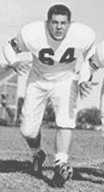
J. D. Roberts as Outland Trophy
winning G at Oklahoma
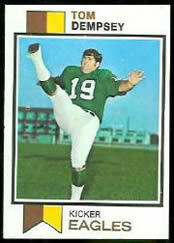
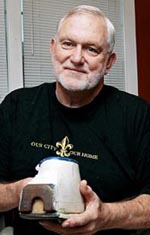
Dempsey in 2010 with one of his special kicking shoes
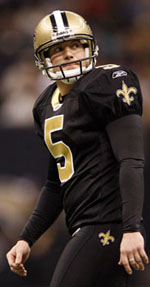
Garrett Hartley |
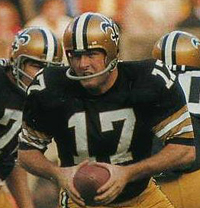
Billy Kilmer
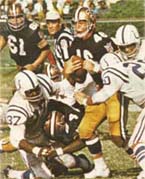
Danny Abramowicz
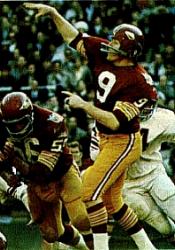
Sonny Jurgensen
|
One of the many reminiscences of Saints' fans that were published following the glorious 2009 season was this one by Bill Becknell, 60, a New Orleans lawyer who was a ball boy on the first Saints team and would eventually become the team's general counsel.
In the last game of the 1967 season, we beat the Redskins up in Washington. I looked out the window of the plane and there were thousands of fans out there; they just ran out onto the tarmac to greet the plane.
- The first Saints team finished 3-11 with a 30-14 victory over Washington on December 17, 1967 before 50,486 at Robert F. Kennedy Stadium. QB
Billy Kilmer, who relieved starter Gary Cuozzo in Q2 after the Saints' O sputtered, passed to SE Dan Abramowicz for two TDs —one 80y with 5:01 left in the first half — to spark the upset.
- The Redskins, who had hoped to complete their first winning season since 1955, finished 5-6-3. Coach Otto Graham's team could take solace in the fact that QB Sonny Jurgensen broke his own NFL record for passing yardage in a season. The 214 he amassed in the losing effort gave him
3,747, eclipsing the 3,723 mark he set as a Philadelphia Eagle in 1961.
- The 80y completion to Abramowicz provided the only scoring in the first half. However, the home team tied the game in Q3 on a 6y pass from Jurgensen to Charley Taylor.
- On the next series of downs, New Orleans was forced to punt from its own 40, but Washington's John Love fumbled the kick and, when he picked it up in the EZ, he was tackled by Dick Anderson for a safety. On the following free kick, Walter "Flea" Roberts returned the punt 68 yards to the one, and Randy Schultz scored on the next play.
- After the kickoff, LB Jackie Burkett intercepted Jurgensen on the Redskins' 41 and returned it 15 yards. Four plays later, Kilmer hit Abramowicz on a 13-yarder to make it 23-7 after Charlie Durkee's PAT.
- Washington attempted to make a comeback as Jurgensen threw a 23-yard TD to A.D. Whitfield with 10:40 to go. But as soon as the Saints got their hands on the ball, Kilmer led them downfield. He handed off to Don McCall on a draw play — the Redskins were expecting a pass — and the RB romped 49 yards for the TD that put the game out of reach.
|
|
|
The 1969 Saints started a miserable 0-6. The seventh game found them on the road at Busch Stadium against the St. Louis Cardinals, who weren't off to the greatest start themselves at 2-3-1.
Needless to say, neither defensive staff was happy with the play of their charges, especially the secondary.
- St. Louis head coach Charlie Winner said afterwards: "I was just disappointed in our defensive showing. I just never thought a Cardinal defense would permit
that many points. It was my most embarrassing moment with the defense. They beat us out on the coverage. We weren't tackling, and we didn't cover well."
- Kilmer explained the Saints problem: "Our CBs were really struggling to stop their receivers, and finally our FS, Dave Whitsell, told (D coordinator) Jack Faulkner, 'Let me play CB. I'll stop 'em.' They put Whitsell over there and they ran right by him, too."
- The 51 points were by far the most the Saints had scored in their brief history. The previous highest tally was 31.
The Saints lost the following week at Dallas before ripping off three straight wins. The finally record for the season was 5-9. Fears survived to coach again in 1970 but was fired halfway through that season and replaced by J. D. Roberts.
Both Kilmer and Johnson changed teams by the 1971 season. Kilmer wore the uniform of the Washington Redskins, who he would lead to the Super Bowl in 1972. Johnson played for the Houston Oilers starting in 1970.
Reference: Tales from the Saints Sideline, Jeff Duncan
"Aerial Show," More Strange But True Football Stories, Zander Hollander
|
|
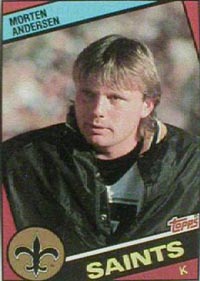
Morten Andersen 1984
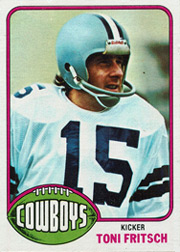 |
Morten Andersen's NFL career started inauspiciously.
- The Saints' fourth round draft choice out of Michigan State sprained his ankle on the opening kickoff of the first game of his rookie season in 1982. He had to turn the place-kicking duties back to Russell Erxleben for the rest of the afternoon. The change had no effect on the game, a 21-7 loss to the St. Louis Cardinals.
- The club placed Andersen on injured reserve for the following week's game, a 10-0 victory at Chicago. Coach Bum Phillips signed veteran K Tony Fritsch to take over place-kicking duties. Then Morten got a break. The players' strike shut down the league for two months.
- When play resumed on November 21, the Great Dane had fully recovered. At first, however, Phillips used him only for kickoffs, sticking with Fritsch for FGs and PATs.
- Finally, Bum turned over FG duties to Mort, who scored his first NFL points with a 45y FG against Tampa Bay in the Dome on December 5. With less than a minute to play, trailing 13-10, Andersen tried a 60-yarder that flew a foot to the right of the goalpost.
- Two weeks later, Andersen regained PAT duty from Fritsch and never relinquished any kicking duties for the remainder of his Saints career.
The following season (1983), Andersen was instrumental in another Saints first.
- His 41-yarder in the Superdome in Week 3 gave the franchise its first-ever OT win, 34-31 over the Bears.
- The Saints had dropped their three previous OT games.
- November 13, 1977: 10-7 to San Francisco in the Dome
- September 2, 1979: 40-34 to Atlanta in the Dome
- December 7, 1980: 38-35 at San Francisco
- It didn't take the Saints long to register their second OT victory. On December 11, 1983, Andersen booted a 50-yarder into the wind to beat the Eagles, 20-17. His 52y FG in Q4 had given New Orleans a 17-3 lead.
Reference: New Orleans Saints: 25 Years of Heroic Effort – Book 2, Christian Serpas
|
Interesting Story: The Great Pizza Revolt
After holding preseason camp at Cal Western University in San Diego for the first two years of the franchise and then Bowling Green University in Ohio the third season, the Saints moved to the University of Southern Mississippi in Hattiesburg for 1971.
- The players hated the food so much that a few days before the first pre-season game, which would be Archie Manning's debut at QB, they staged a walk out one evening.
- At 7 pm, the Saints checked in, walked down the chow line, took nothing, and left.
- The entire squad, with only one exception, departed for a local pizza parlor.
- As the gang filed in, TE Dave Parks placed the order. Something like, "10 anchovy, 12 mushroom, 13 pepperoni, 15 combination, and one sardine." Imagine the startled teenager behind the counter!
- The lone dissenter was P Julian Fagan, Manning's teammate at Ole Miss. Fearing a fine, he ate alone in the USM cafeteria.
- His stratagem backfired. Coach J. D. Roberts fined only Fagan, explaining, "I want this team to stick together."
- The Saints organization tried to cover up the walkout, claiming it was a pizza party to welcome Parks to camp after he finally signed his contract earlier that day.
Parks' holdout had ended when Commissioner Pete Rozelle intervened.
- In April, GM Vic Schwenk wanted Parks to take a 40% cut or not report to camp.
- Naturally, the TE declined and insisted that, under NFL regulations, the most the Saints could reduce his salary was 10%.
- When Rozelle ruled in Dave's favor, Schwenk offered a contract with only the 10% cut, reportedly from $70,000 to $63,000.
- Parks, who had signed with the Saints in 1967 after four seasons with the 49ers, had not started a single game in 1970 and caught only 26 passes.
Despite the players' rebellion, the Saints returned to Hattiesburg for two more preseason camps.
References: Tales from the Saints Sidelines, Jeff Duncan
|
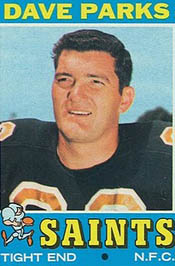
Dave Parks
Julian Fagan
|
|
CONTENTS
Bobby's Hebert's Terrible Year
Memorable Game: Rams 10/23/94
Interesting Story: Bum Takes Over
Dazzling Debut: Aaron Brooks
Memorable Game: The Longest Boo
Profile: Tom Dempsey
The Love Affair Started Early
Record Breaker: 12 TD Passes
Firsts: Andersen Points, OT Victory
The Great Pizza Revolt
Saints Saga I
Saints Saga III
Saints Saga IV
Saints Saga V
Saints Saga VI
Saints Saga VII
Saints Saga VIII
Saints Saga IX - 1987
Football Magazine
Golden Rankings Home
Top of Page
|



















